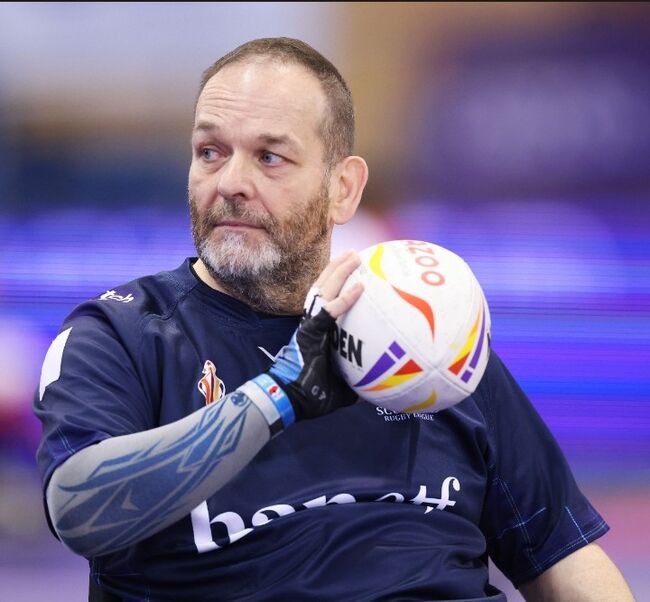
"The support from the Fund has allowed me to maintain a feeling of independence and normality"
Published:
Categories:
An unexpected diagnosis of Hereditary Spastic Paraplegia (HSP) left RAF veteran Midge Hartley in need of home adaptations to support his day-to-day living, because of his impacted mobility.
55-year-old Midge Hartley joined the RAF in 1986 in the pursuit of new life experiences. His career saw him producing highly detailed flight planning products, analysing imagery, and touring across the globe as a Flight Sergeant.
But Midge's career came to an unfortunate end when he was unexpectedly diagnosed with HSP and discharged from the RAF after 27 years of service.
Midge said: “In 2007 my life took an unexpected turn when I was diagnosed with a rare genetic condition called HSP.”
HSP is a degenerative neurological condition which affects approximately 1 in 77,000 people. The disorder causes lower limb weakness, balance issues, muscle stiffness and involuntary spasms - all of which have impacted Midge's mobility.
Midge continued: "HSP mainly affects a person’s lower limbs. Therefore, the main difficulties I face daily are associated with my mobility and balance. I struggle to transition from a seated position to a standing position and experience legs spasms on a regular basis. As a result, I now need to use a mobility aid, such as a crutch to move around safely. In addition, there is an element of pain and fatigue management that I need to endure as it takes more effort for me to achieve things able-bodied people can do."
Receiving news of an unforeseen illness or accident can be traumatic and life changing, but the RAF Benevolent Fund is there to support the RAF Family in their hour of need
Throughout Midge's career in the RAF, he contributed a percentage of his wages towards a Service Day Pay Giving scheme, designed to supplement charitable organisations such as the Fund.
Now as a beneficiary for the Fund, Midge can attest first-hand the importance of charitable organisations that are able to step in and get things moving when help is needed quickly.
Midge said: "After leaving the Service, I wanted to ensure that my new home was as functional and suitable as possible, whilst catering for the restrictions/limitations associated with my condition. The bathroom was one of my main areas of concern. The Fund very kindly provided me with most of the funding needed to convert the bathroom into a wet room. They also ensured that the adaptations not only catered for my immediate needs, but also considered any potential future requirements that may arise, such as wheelchair access."
He continued: "The support given by the RAF Benevolent Fund has allowed me to maintain a feeling of independence and normality. When you have a disability, the feeling of self-sufficiency can have a positive impact on both your physical and mental wellbeing.
Getting the support I needed, at the time I needed it most meant that I didn’t have to spend long worrying about the worst-case scenario and was able to get on with living a more fulfilling life."
On average, beneficiaries receive a response from our Welfare team ten days after submitting an application. This means that for beneficiaries like Midge, help can come quickly, and unnecessary hardships can be avoided.
Midge said: "I was looking for a grant to support me self-funding the conversion of my bathroom. The help of the RAF Benevolent Fund meant that I was able to speed up the process and avoid instances of discomfort that would’ve otherwise occurred if I hadn't had my adaptations complete in time."
To find out more about how the RAF Benevolent Fund support the Welfare needs of our beneficiaries, click here. If you, or someone you know is in need of support from the RAF Benevolent Fund, welfare applications can be found here.